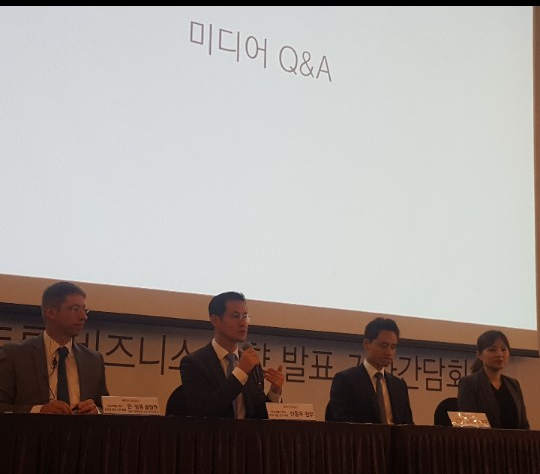Pfizer Korea Consumer Healthcare한국화이자 컨슈머헬스케어 unveiled its wellness business strategy and the global portfolio for “Centrum,” a multivitamin product that converted from generic drugs to functional foods, Thursday.
Centrum is a complete multivitamin specially formulated to include all the essential vitamins and minerals human bodies require on a daily basis.
Pfizer announced six products of Centrum, four of “Centrum Gender” reflecting the nutritional requirement according to sex and age, “Centrum Pro” and “Centrum Silver Pro” for pharmacies.
“We hope that Centrum's business changes in the Korean market will improve efficiency and outsource global nutrition strategies to contribute to improving nutritional management for Korean consumers with diverse needs,” said Shin Dong-woo신동우, Pfizer’s cluster general manager for Korea, Japan, and India.
Jan-Willem van Klinken, senior director of Pfizer's Global Medical Affairs in Nutrition, unveiled the stages, benefits and clinical trials for Centrum.
“Centrum multi vitamins were chosen and have played a key role in many large-scale, long-term clinical studies sponsored by the U.S. National Institutes of Health (NIH) to advance scientific knowledge about the health benefits of dietary supplements and adequate vitamin and mineral intake,” Klinken said. “We have committed over 1 million hours of research, making Centrum brand multi vitamins the most clinically studied in the world for 11 years.”
Based on studies formulated for Korean consumers and recommendations from the Ministry of Health and Welfare보건복지부, Klinken explained the different gender and life stages reflecting different nutrient needs.

“Women have higher requirements for iron and folate, due to the loss of blood from menstruation and for pregnancy to prevent neural tube defects. Men have higher dietary requirements for some nutrients based on energy needs or body size, for example, magnesium, zinc, and thiamin.”
He added that older adults had increased needs for Vitamin D, B and calcium due to lack of estrogen in post-menopausal women that leads to the loss of calcium from their bones and reduced efficiency of Vitamin D synthesis in the skin.
Towards personalized nutrition, the key factors that determine the differences are dietary habits that differ across countries, ethnicities and social, economic status. Conditions and behaviors may require different nutritional needs as well for individuals who have obesity, pre-diabetes or who are athletes.
“Centrum supplementation use at recommended nutrient intake levels can be considered safe and is well tolerated,” Klinken said. “The use of daily multivitamin supplements is an effective way to close the dietary gap.”
Kim Yoo-sup김유섭, the marketing head of Global Pfizer, explained about the dietary supplement market trends.
“A particular trend that Pfizer noticed is that society is getting smarter from inquiring abundant knowledge from the Internet,” Kim said. “By gaining knowledge, the younger generation is taking action on their needs for nutritional supplements. They ask specific questions and read the labels carefully to get a better understanding of the product.”
Realizing that the younger generation is becoming critical consumers, Kim unveiled plans for new formulations such as liquid, jelly and powder forms.
“Different customer needs are increasing, so the market will try to cater them, and we expect that the difference among various supplements will fade shortly. It will be easier to administer, and there will be a merge between different industry sectors,” he said.

